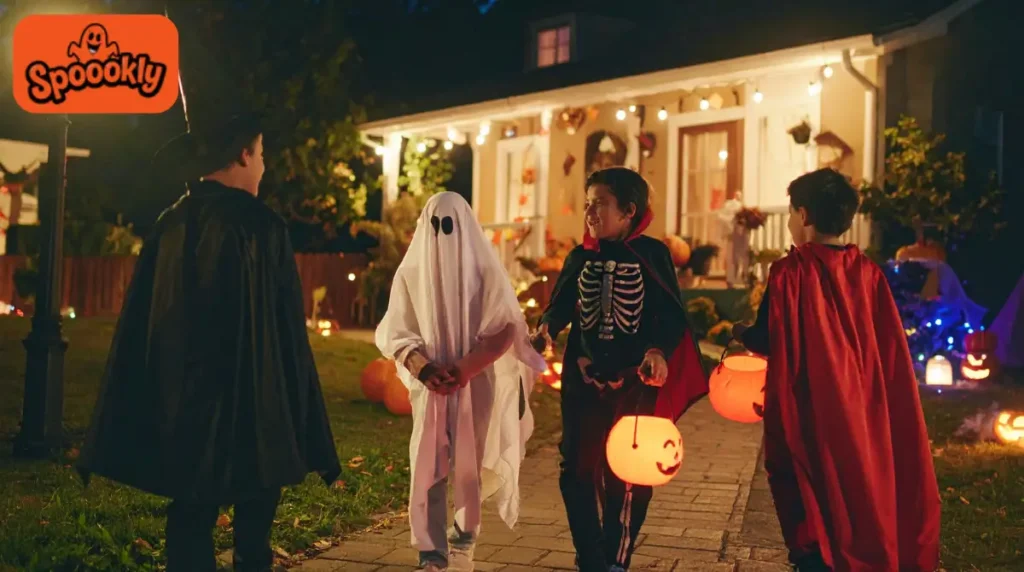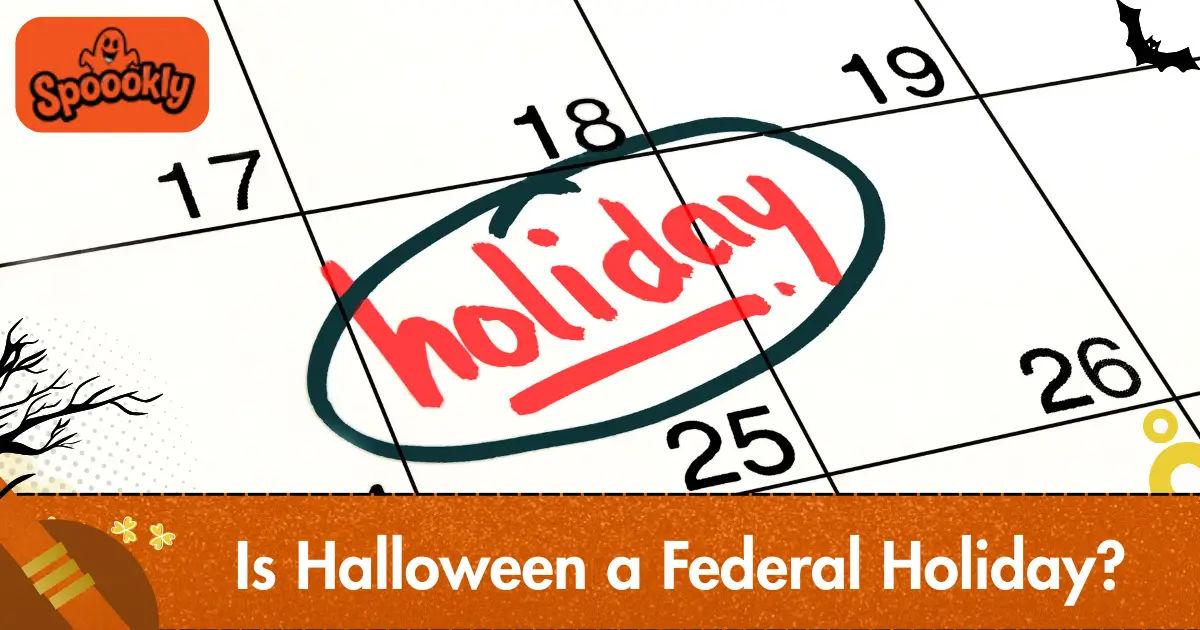Every year on October 31, people across the United States dress up, hand out candy, and decorate their homes with skeletons, cobwebs, and pumpkins.
Because the celebration feels so big, many people assume it must be an official holiday. So, is Halloween a federal holiday in the U.S.? The short answer is no. Halloween is not a federal holiday.
This matters more than you might think. If you work for the government or in a bank, you don’t automatically get the day off. Schools don’t shut down nationwide either.
Halloween is celebrated widely as a cultural event, but in legal terms, it doesn’t fall into the same category as Christmas, Independence Day, or Thanksgiving.
In this article, I’ll explain what makes a day a federal holiday, why Halloween doesn’t qualify, and how this difference affects schools, workplaces, and even how people think about “holidays” in the first place.
What Counts as a Federal Holiday?
To understand why Halloween doesn’t make the list, you first need to know what a federal holiday actually means.
A federal holiday is a day officially recognized by the U.S. government. These holidays are created by acts of Congress and are listed in Title 5 of the U.S. Code.
Here’s what happens on a federal holiday:
- Government offices close. That includes agencies, courts, and federal departments.
- Federal employees get paid leave. If you work for the government, you don’t lose income on those days.
- Banks often close because they follow the federal holiday calendar.
- Mail delivery pauses, since the U.S. Postal Service observes federal holidays.
In other words, a federal holiday is not just a celebration. It comes with legal obligations and workplace rules that affect millions of Americans.
Also explore when is New York Village Halloween Parade 2025 happening and also know its time, date and locations.
The List of U.S. Federal Holidays
The United States currently recognizes 11 federal holidays. These are:
| Federal Holiday | Date Observed |
|---|---|
| New Year’s Day | January 1 |
| Martin Luther King Jr. Day | Third Monday in January |
| Presidents Day | Third Monday in February |
| Memorial Day | Last Monday in May |
| Juneteenth National Independence Day | June 19 |
| Independence Day | July 4 |
| Labor Day | First Monday in September |
| Columbus Day (or Indigenous Peoples’ Day in some states) | Second Monday in October |
| Veterans Day | November 11 |
| Thanksgiving Day | Fourth Thursday in November |
| Christmas Day | December 25 |
Notice what’s missing? Halloween. October 31 is not on this list, no matter how many pumpkins get carved or how many kids roam the streets for candy.

Why Halloween Feels Like a Holiday Anyway
If Halloween isn’t on the federal calendar, why do so many people think it is? The answer is cultural power.
Halloween is one of the most celebrated days in America. Stores roll out seasonal displays weeks in advance, and neighborhoods turn into mini haunted houses.
From a cultural perspective, Halloween looks like a holiday. But from a legal standpoint, it’s treated the same way as Valentine’s Day: fun, festive, and commercialized, but not an official day off.
Halloween: Origins and Cultural Significance
Halloween didn’t just appear out of nowhere with costumes and candy. Its roots go back thousands of years. The holiday traces back to the Celtic festival of Samhain, which marked the end of the harvest season and the beginning of winter.
Ancient Celts believed the boundary between the living and the dead grew thin on this night, so spirits could cross over.
When Christianity spread across Europe, the church adapted this festival into All Hallows’ Eve, the night before All Saints’ Day. Over time, traditions blended, bonfires, costumes, and prayers for the dead slowly evolved into what we now call Halloween.
When Irish and Scottish immigrants brought their customs to the United States in the 19th century, Halloween took on a new life.
Today, it’s less about warding off spirits and more about costumes, trick-or-treating, haunted houses, pumpkins, and candy sales that skyrocket every October.
So, culturally, Halloween is a huge deal in America. But legally, it’s still just another day on the calendar.
Why Halloween Isn’t a Federal Holiday
If Halloween is so widely loved, why hasn’t it been granted official status? The answer lies in how federal holidays are created.
For a day to become a federal holiday, Congress has to pass a law recognizing it under Title 5 of the U.S. Code. No such law exists for October 31.
Here’s why:
- Federal holidays are rare. Only 11 exist, and they’re usually tied to national history, public service, or religious observances with long-standing significance.
- Halloween is cultural, not civic. It’s not tied to the founding of the nation, military service, or major political history.
- It’s already celebrated without being official. Unlike Independence Day or Christmas, people don’t need the government to tell them to celebrate Halloween.
Think of it this way: federal holidays carry legal weight, while Halloween carries cultural weight. That difference is why it hasn’t made the official cut.
What It Means That Halloween Isn’t a Federal Holiday
Because Halloween doesn’t appear on the federal calendar, daily life on October 31 runs mostly as usual.
- Schools stay open. Students may wear costumes or have parties, but it’s still a regular school day in most districts.
- Government offices run normally. No closures, no paid day off. Your local DMV isn’t suddenly handing out candy instead of licenses.
- Banks and businesses remain open. Unlike Christmas or Thanksgiving, commerce continues as usual.
That doesn’t mean employers or schools never make exceptions. Some workplaces host costume contests or allow employees to leave early.
Certain communities may schedule parades or local events that affect hours. But nationally, there’s no blanket policy because Halloween isn’t in the same category as federal holidays.
Common Misconceptions About Halloween as a Holiday
One big reason people think Halloween is a holiday is the word itself. In everyday language, “holiday” means a fun celebration. But in legal terms, it means a government-recognized day with closures and paid leave.
Here are the main points of confusion:
- “Holiday” vs. “Federal Holiday.” People use the word “holiday” loosely, so they assume Halloween qualifies in the legal sense.
- Media and marketing hype. Stores market Halloween like it’s as big as Christmas, which blurs the lines.
- School celebrations. Costume parades and candy parties make kids think it’s a real day off, even though classes are still held.
So while Halloween is a holiday in spirit, it’s not one in federal law.
Comparisons With Other Observances
It helps to compare Halloween with other well-known days.
- Federal holidays with official recognition: Independence Day, Christmas, and Thanksgiving all include government closures and legal backing.
- Cultural observances without official status: Valentine’s Day, St. Patrick’s Day, and Halloween are all widely celebrated but do not grant time off work.
This comparison shows the distinction clearly: Halloween is on the same level as Valentine’s Day, festive and cultural, but not official.
Conclusion
So, is Halloween a federal holiday? No, it’s not. But it’s still one of the most celebrated cultural events in the U.S. Every October 31, millions of Americans decorate their homes, wear costumes, and share candy.
The difference is legal recognition. Federal holidays mean government closures and paid leave. Halloween, despite its massive cultural presence, doesn’t carry that status.
Still, does it matter? Not really. People don’t need Congress to tell them when to carve pumpkins or dress up as superheroes. Halloween thrives because of culture, not law.
If you ever hear someone claim Halloween is a federal holiday, you’ll know the truth and maybe you can win the argument at the next office party.
FAQs
No. Federal employees work as usual on October 31. There is no government-wide closure.
No. Most stores, banks, and offices remain open. Some may adjust hours for local events, but closures are not mandated.
Not officially. Some towns or schools may organize celebrations, but no state grants Halloween full holiday status.
A federal holiday is backed by law, with closures and paid leave. An observance is a cultural or local tradition without legal requirements.

